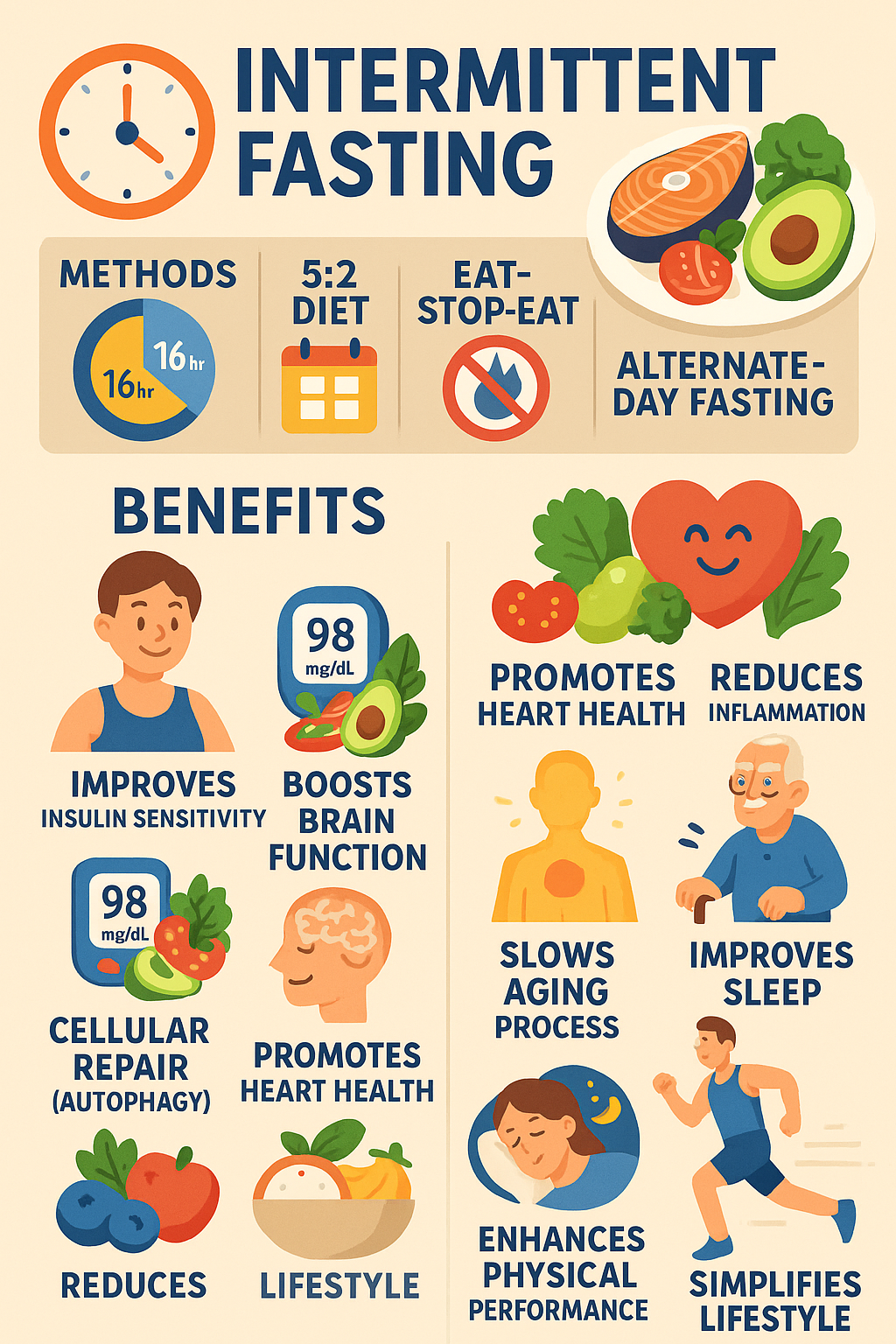⏰ What is Intermittent Fasting? 10 Powerful Benefits Backed by Science! 🥗🔥
Have you ever wondered how people manage to lose weight, feel more energized, and even slow down aging—all without giving up their favorite foods? Welcome to the world of Intermittent Fasting (IF)! 🙌
In this article, we’ll break down what intermittent fasting is, the science behind it, and over 10 amazing benefits you can experience from this simple yet powerful lifestyle. Whether you’re a beginner or curious skeptic, this guide will give you everything you need to know. 🌟
🧠 What is Intermittent Fasting?
Intermittent Fasting is not a diet in the traditional sense—it’s an eating pattern. Rather than focusing on what you eat, intermittent fasting focuses on when you eat. 🕐
🕒 Common Intermittent Fasting Methods:
16/8 Method – Fast for 16 hours, eat within an 8-hour window
5:2 Diet – Eat normally for 5 days, reduce calories to 500–600 for 2 non-consecutive days
Eat-Stop-Eat – Do a full 24-hour fast once or twice a week
Alternate-Day Fasting – Fast every other day
OMAD (One Meal A Day) – Eat all your calories in a single meal each day
💡 Why Do People Fast?
Fasting isn’t a new concept—it’s been practiced for centuries for religious, spiritual, and health reasons. Today, science is catching up with tradition and showing us the powerful benefits fasting has to offer. 💪
🔟 Top Science-Backed Benefits of Intermittent Fasting
1. ⚖️ Effective Weight Loss Without Calorie Counting
Intermittent fasting helps your body burn stored fat by lowering insulin levels and extending your “fat-burning” window. 🔥
Boosts metabolism by 3–14%
Encourages fat loss while preserving muscle
Fewer meals = fewer overall calories
2. 🩸 Improves Insulin Sensitivity
Insulin resistance is a root cause of Type 2 diabetes. IF helps lower insulin levels and improve your body’s insulin sensitivity.
Reduced fasting insulin by up to 31%
Lower blood sugar levels
Prevents metabolic diseases
3. 🧠 Boosts Brain Function & Mental Clarity
Fasting triggers the production of BDNF (Brain-Derived Neurotrophic Factor), a protein that supports brain growth and memory. 🧠✨
Improves focus and concentration
May protect against Alzheimer’s and Parkinson’s
Reduces brain fog
📸 [AI Image Placeholder: Brain with glowing neurons, person meditating peacefully]
4. 🔬 Activates Cellular Repair (Autophagy)
During fasting, the body enters autophagy—a powerful detox process that clears out damaged cells. ♻️
Prevents buildup of dysfunctional proteins
Supports regeneration and longevity
Reduces risk of cancer
5. ❤️ Promotes Heart Health
Intermittent fasting improves key risk factors associated with heart disease:
Lowers blood pressure
Reduces LDL (“bad”) cholesterol and triglycerides
Decreases inflammation
6. 🔥 Reduces Inflammation
Chronic inflammation is linked to diseases like arthritis, cancer, and aging. IF significantly reduces inflammation markers. 🧯
Helps joint pain
Enhances immune function
Speeds up healing processes
7. 👵 Slows Down Aging
Who doesn’t want to age gracefully? IF activates genes linked to longevity and DNA repair.
Increases longevity in animal studies
Supports mitochondrial health
Boosts human growth hormone (HGH) by up to 5x
8. 😴 Improves Sleep Quality
Many people find that they sleep more soundly when practicing IF—especially when eating stops several hours before bedtime.
Supports melatonin production
Reduces digestive activity at night
Calms the mind before bed
9. 🏋️♂️ Enhances Physical Performance
Fasting increases energy, focus, and endurance—especially in morning workouts.
Elevated adrenaline levels
Burns fat more efficiently during exercise
Helps maintain muscle mass
📸 [AI Image Placeholder: Athlete running or lifting weights with high energy]
10. 🧘♀️ Simplifies Your Day
With fewer meals to plan, shop for, and cook, your daily routine becomes easier.
Saves time and money
Reduces stress about food
Encourages intentional eating
🤔 Is Intermittent Fasting Safe?
✅ Yes—for most healthy individuals.
But it’s not for everyone.
❗ Avoid IF if:
You’re under 18 or pregnant
You have an eating disorder history
You’re diabetic (without doctor supervision)
Always consult a healthcare provider before starting.
🛠️ How to Get Started with Intermittent Fasting
Pick a method – Try the 16/8 method for 1–2 weeks
Stay hydrated – Water, black coffee, and herbal teas only during fasting
Break your fast with nutrient-dense meals 🥗
Avoid binging after fasting periods
Be consistent and patient
📝 Sample Intermittent Fasting Schedule (16/8)
8:00 AM – Black coffee or water
12:00 PM – First meal (high in protein and veggies)
4:00 PM – Light snack (nuts, yogurt, fruits)
7:30 PM – Last meal of the day
8:00 PM to 12:00 PM next day – Fast
🌟 Final Thoughts
Intermittent fasting is more than a trendy weight-loss method—it’s a lifestyle upgrade. With science on its side, IF can help you lose weight, think clearer, reduce inflammation, and live a longer, healthier life. 🌿✨
If you’re looking for a natural way to reset your body, intermittent fasting may just be the key! 🔑
**Disclaimer: The video in the article is generated by canva.com AI and Audio is used by Samsung AI and article content by Chatgpt.**











Join Us on Social Media!
Stay updated with the latest from EasyBuzz. Connect with us: